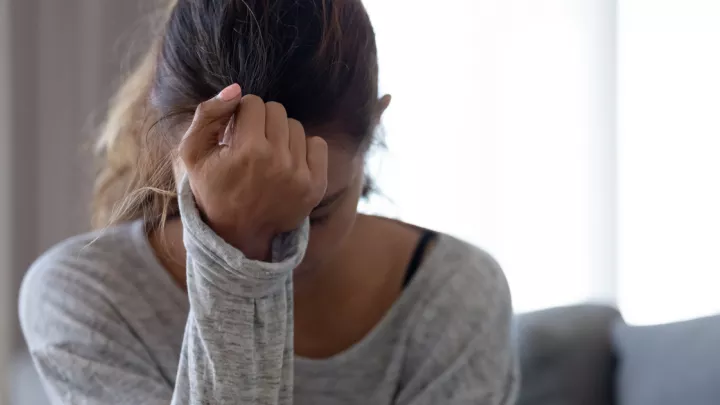How loneliness affects your health

In November 2023, the World Health Organization launched a commission on social connection. This commission is the first global initiative designed to address the epidemic of loneliness – affecting approximately 50% of U.S. adults daily. The epidemic worsened thanks to the increased social isolation caused by the COVID-19 pandemic.
According to the Centers for Disease Control and Prevention, this loneliness costs the U.S. economy an estimated $406 billion annually. More importantly, loneliness and social isolation adversely impact your health in numerous ways.
What is loneliness?
The CDC defines social isolation as a lack of relationships with others and little or no social support or contact. Likewise, it describes loneliness as feeling alone or disconnected from others.
“In psychiatry, there’s not a standardized clinical definition for a diagnosis of loneliness,” says psychiatrist Priya Gearin, MD. “But I think of it as lacking a sense of belonging. Not necessarily being alone, but feeling alone, both emotionally and mentally.”
If you’re feeling that other people aren’t understanding you and your feelings, you may be experiencing loneliness. “It’s feeling disconnected from people, whether at work or with family or friends,” says Dr. Gearin. “Even when you’re going to social gatherings that you expect to enjoy, but you’re feeling like you just don’t quite fit in, or you don’t have much to contribute, you’re likely lonely.”
How loneliness impacts health
“From a mental health standpoint, loneliness can be a part of different disorders like depression or anxiety,” says Dr. Gearin. “On a larger scale, there’s evidence that loneliness can negatively affect other parts of your health, including your immune and cardiovascular systems.”
Per the CDC, social isolation and loneliness increase your risk of:
- Dementia by 50%
- Heart disease by 29%
- Stroke by 32%
Loneliness also raises your likelihood of:
- Diabetes
- Addiction
- Depression and anxiety
- Dementia
- Earlier death for older adults
- Suicidality and self-harm
Common causes of increased loneliness
The reasons behind feelings of loneliness or social isolation will vary from person to person. “I think it can depend a lot on the phase of life you’re in,” says Dr. Gearin. “I see many younger people: kids, teenagers and young adults who feel lonely from major life transitions like moving to a different place or starting a new school or job.”
Other significant factors that can increase loneliness are:
- Chronic medical conditions
- Physical or other disabilities
- Financial strain or insecurity
- Losing a spouse, a friend or being the last one alive in your peer group
- Being a part of a minority group, like immigrants or LGBTQ+
Those in minority groups are especially susceptible to social isolation if they don't have the option to connect to other people within their minority group if they prefer. "We're humans, and we all need human connection," says Dr. Gearin. "Loneliness can creep in when there's not much of that connection.”
Separating loneliness from other mental health conditions
“When addressing mental health disorders, like major depression or generalized anxiety, there’s a predetermined criteria you have to fulfill to meet that diagnosis,” says Dr. Gearin. “For example, for depression, you must have five different symptoms, like trouble sleeping, loss of appetite, mood feeling low or suicidal thoughts or behaviors.”
Loneliness isn't a disorder itself, nor is it a symptom of a mental health issue. "Loneliness isn't necessarily one of these features," says Dr. Gearin. "It's more secondary to those conditions, adjacent to it." Still, because of its significant adverse impact on your health, it's vital to address loneliness or social isolation when you feel it.
Methods to combat loneliness
If you're experiencing loneliness or social isolation, it can often feel like there are no answers or hope. Thankfully, there are several ways anyone with these feelings can improve their day-to-day emotions regarding loneliness and social isolation. These methods include:
Talk with a therapist
Talk therapy, specifically cognitive behavioral therapy, can help combat loneliness through behavioral activation. "This concept is especially beneficial for people who are depressed or socially anxious," says Dr. Gearin. Behavioral activation is a method to get individuals to practice specific behaviors deliberately. "There's evidence that the more you force yourself to get out and do the activities you need to do or used to enjoy, the more likely you'll eventually feel positive about them," says Dr. Gearin.
Additionally, talk therapy, in general, can be beneficial for those experiencing loneliness, as it helps people see other perspectives on their own day-to-day thoughts. “I think loneliness can lead to automatic thoughts about ourselves and the world, some of which might even be true,” says Dr. Gearin. “But when you’re focused only on the negative, you’re not looking at the whole picture.”
See a psychiatrist
A lot of people might start with talk therapy before seeing a psychiatrist, especially if their condition isn't terribly severe. Still, some people will need medications to assist their treatment. "It's very reasonable to add on medication to your treatment, especially for adults," says Dr. Gearin. When you meet with a psychiatrist, they'll first complete a comprehensive evaluation, asking questions about your mental health, sleep, appetite and other related topics.
“Then, we'll make some recommendations for what the most accurate diagnosis seems to be while also recommending what type of therapy, medication or a combination of both would be most helpful," says Dr. Gearin. Medications can be a significant tool to fight loneliness, especially if it's part of a more considerable mental health condition.
Spend quality time with your existing relationships
While loneliness and social isolation can make reaching out to your loved ones difficult, spending time with these people is an excellent way to fight these feelings. "It's vital to water the relationships you want to grow," says Dr. Gearin. "Make a point to be fully present and mindful when spending time with these people." For example, putting away phones and other electronics is a good practice since they can cause disconnection and get in the way of your feeling together.
Start a daily gratitude practice
According to Dr. Gerain, there's evidence that practicing daily gratitude can boost mental health and combat loneliness. A daily gratitude practice – such as writing down three things you're grateful for in the morning or at night – is a great way to push back on the feelings that amplify loneliness and social isolation. "When we're lonely, our brains tend to be in a negative space, and you see things through a negative lens," says Dr. Gearin. "So, a gratitude practice pushes back on these feelings.”
Nebraska Medicine is here to help
“Ultimately, everyone's personality is unique, and everybody has a different level of alone time that feels healthy," says Dr. Gearin. Moreover, there's a distinction between being physically alone and feeling lonely. "Some people, when physically alone, might feel really in their element, which can be healthy, especially for more introverted folks.”
Still, if you're someone who's struggling with loneliness and social isolation, you should seek help. Nebraska Medicine mental health providers, like Dr. Gearin, can help you break through your negative thoughts and address other underlying issues that may be increasing your feelings of loneliness.







